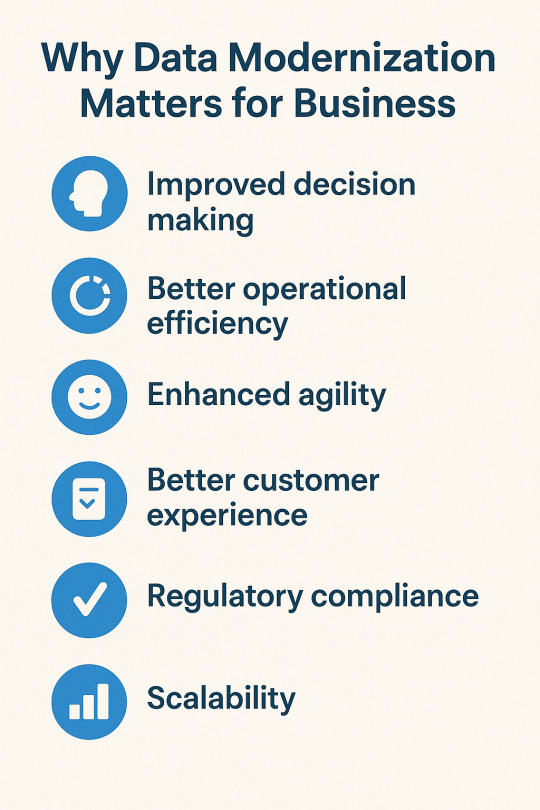#data modernization
Explore tagged Tumblr posts
Text
0 notes
Text
Improve Business Performance with Data Modernization

Data modernization empowers better decisions, agility & customer experience. Explore the blog to know why it’s vital for today’s businesses to stay competitive and compliant.
0 notes
Text
Data Modernization in Singapore:- AI-driven Data Modernization | Applify!
Unlock Intelligent Decision-Making and Innovation With AI-Powered Data Modernization in Singapore. Migrate, Optimize, and Secure Your Data Ecosystem For Seamless Analytics, Real-time Insights, and Scalable Performance. Book a Free Consultation Today!
#Data Modernization#Data Transformation#Data Analytics#Data Governance#Data Management#Data Security
0 notes
Text
Data Modernization is not just a luxury but a necessity in today's data-driven business landscape. Organizations can unlock many benefits by adopting modern technologies and practices. Improved data processing efficiency, enhanced scalability, and cost savings are just the tip of the iceberg. Organizations are strongly compelled to adhere to evolving regulations, gain invaluable insights for informed decision-making, and cultivate operational agility and flexibility. Moreover, cloud-based platforms enable seamless integration, collaboration, and innovation.
0 notes
Text
What role should the IT department play in an organization's "data modernization" initiatives?
When it comes to data governance what role should the IT Dept. play?
Is Data Governance on a collision course with Corporate Governance? I submit it may be. The rationale is that the following perceptions (fair or unfair, true or false) will take root at the executive level:– Data Governance focuses on technology – data catalogs.– Data Governance does not know how to / will not do effective data policy work.– Data Governance does not know how to / will not…
0 notes
Text
#Enterprise Data Services#Enterprise Data Solution#Enterprise data management#enterprise data management services#enterprise data transformation services#enterprise data & analytics services#enterprise data & analytics solution#Enterprise Data Landscape#Maturity Assessment#Enterprise Data Migration#Data Landscape Modernization#data landscaping solutions#data modernization#DataOps services
1 note
·
View note
Text

Rawcubes stands out among the organizations that provide data modernization services by offering cutting-edge data transformation assessment services.
0 notes
Text
Ensuring Data Protection: Six Critical Steps to Modernize Data Security
Discover the essential strategies for safeguarding sensitive information in the digital age with our latest blog post. Learn how to fortify your data protection measures by following these six crucial steps to modernize data security. Stay ahead of evolving cyber threats and enhance your organization's resilience against data breaches.
0 notes
Text
I've finally done what I inevitably do for nearly every fandom i get into: I've made a deranged spreadsheet tracking some linguistic element in a piece of media! this time it's tracking the usage of swears in Scum Villain. if you're curious, here's the full spreadsheet, but I'll write up my findings here
some notes on my methods!
I differentiated between internal and external use. external use is pretty straight forward, that's just dialogue said out loud. for internal use, that's when it's used in the narration. obviously, this is skewed towards Shen Qingqiu as our primary POV character, but occasionally the narration dips its toes into other characters' perspectives, so I kept that in mind and assigned the usage to whoever seemed most relevant in that snippet of narration. also, in the case of the transmigrators, I also counted speech directed at the System as internal because they're less likely to self-censor when talking to the System because no one else can hear them
this was done by searching for specific words and their variants in online copies of the official English translations of all four books. there are a bajillion different swears in the English language, but I tried to focus on the most common/most likely to be used. also, since I was searching for the words manually, there are going to be some that are missed because they're written out abnormally, like lengthening the word for emphasis (eg. fuuuuuuuuuck) or censoring it (eg. b- [BLEEP]). side note, i don't know why the hell SQQ ever censors anything since he seems pretty comfortable thinking some pretty foul things without censoring them, but whatever.
now for the results! data breakdown under the cut
in total, of the swears I searched for, there's 286 swears across all four books. book two is the most vulgar, with 82 swears, and book three is the least, with only 52. book two also has the most variety (14 different words) and book three has the least variety (only 10 different words)
perhaps unsurprisingly, out of these 286 swears, SQQ's internal narration is responsible for 200 of them. his most used swear is "fuck" which appears 106 times in total and 86 times from SQQ (internal) specifically
following SQQ (internal) in the rankings is Shang Qinghua (internal) at 30 in total. his most used swear is "fucking." after that is SQH's external dialogue (14 swears, most used is "fuck") and then SQQ's external dialogue (11 swears, tied between "fuck" and "fucking"). considering how much he swears in his head, I think SQQ is exhibiting a surprising amount of restraint when it comes to swearing out loud!
aside from the transmigrators, the most vulgar side character is, surprisingly, Shen Jiu! he gets two internal uses of "fuck" and two external swears ("shitty" and "damn"). these are all from when he was younger, so perhaps this is a habit he broke when he got older and had to present a particular image as peak lord
the only other side characters who swear are Sha Hualing (internal), Bingge (internal), Linguang-Jun (external), Qiu Jianluo (external), and Ming Fan. all of them only swear once except Ming Fan, who gets two (one internal and one external)
of the 18 swear words I tracked, SQQ used all of them except one. the only person to say "bitch" is Ming Fan, out loud. #MingFanMisogynyMoments
SQQ does, however, have a monopoly on motherfuck/motherfucker/motherfucking, goddammit, dumbass, dick, and pussy. damn dude, you kiss your disciple with that mouth?
pre-transmigration, Shen Yuan swore three times in one forum post, those being "fucking," "damn," and "ass."
most usages of "ass" are for emphatic purposes, like "Relax, my ass!" Both SQQ and SQH really enjoy this construction lol
despite volume two being the most vulgar, it has the least variety of speakers! SQQ is responsible for all but two of those swears, the other two belonging to Sha Hualing and Ming Fan. volume four has the most variety, likely because it just involves a wide variety of characters
and that's my data roundup! go forth and use this as a resource when choosing how to insert swearing into your SVSSS dialogue <3
#svsss#my meta#linguistics blogging#this was really fun to do!#sqq swears SO MUCH. MY GOD DUDE.#but it's almost entirely in his head!#he generally shows restraint out loud#most of the times he swears out loud it's either to sqh or because he's shocked somehow#binghe NEVER swears (out loud at least) so I love thinking about his shock when shizun suddenly reveals his foul mouth#sqh has much less restraint lol he swears a lot out loud in comparison to how much screentime he gets#based on this it seems like people in this setting swear a lot less than modern people#usually when non-transmigrators swear it's not painting them in a good light#like. just look at that list of side characters.#we've got sj (foul personality + bad circumstances. stops once he's an adult)#shl and mf (swearing in their heads when under duress)#bingge (an asshole. and out of his depth)#lgj and qjl (both The Worst™)#and then mf's use of bitch is when little palace mistress slaps ning yingying so tbh i think that's justified#anyway. i find this kind of data really interesting for characterization purposes! i hope you guys do too!#it's likely a lot of characters swear more in their heads but we don't know because we don't get their pov#but i still don't think they come anywhere close to the transmigrators lol#anyway i need to go to the lab now and do more professional linguistic work lol
97 notes
·
View notes
Text
Extremely important poll
Pls reblog to increase sample size thx <3
#Minecraft#poll#I can’t tag this anything else because that would influence the data#if I tag for herobrine of course more people who know herobrine would see it#obviously tagging Minecraft will influence the numbers too#but I want to see what the average modern Minecraft player knows#cause my friend has never heard of herobrine#and it left me absolutely gobsmacked flabbergasted#cause they play like#heavily modded survival Minecraft#we were both playing it literally today#but they had never heard#and I need to know#if the ancient lore has been lost to time#cause I mean#if he is#we can bring him back
74 notes
·
View notes
Text
Redefining the role and responsibilities of analysts and consultants to achieve procurement's digital transformation success
The key to digital transformation success - turnkey services versus turnkey system assimilation.
EDITOR’S NOTE: The best way to “hash out” an idea or concept is through open and honest dialogue. The following exchange is a perfect example of respectful debate and discussion toward a conclusion. By the way, what are your thoughts—should analysts/consultants take more responsibility for client success? Dr. Thierry Fausten • Procurement Excellence | On-demand Procurement Director | Switzerland…

View On WordPress
0 notes
Text
Writer: Look at this "emotionless" (but secretly emotion having) non-human character I made!
Autistics: just like me fr
Writer:

#posting this here and not on the trek blog because i don't think the writers even knew about autism when spock or data were created so i'll#give them a tentative pass for now. but modern writers? lol. lmao even.#mine#personal#actually autistic
209 notes
·
View notes
Text
“Allow ads on our site please” fuck you, all of your advertisements are either misinformation, deceptive mobile game promos, gross body horror, nothing relevant to me, a virus or (usually) all of the above.
Every ad I see is dangerous. I don’t think I have ever purposely clicked on an online ad. No, I will not disable my ad blocker. Go to hell.
270 notes
·
View notes
Text
Unleashing the Future: The Power of AI-Driven Language in Identifying Technological Time Warps
Embark on a thrilling exploration of the transformative capabilities of AI-driven language in detecting and unleashing the potential of technological time warps. This blog delves into the revolutionary impact of AI language models, showcasing their ability to decipher complex patterns, predict emerging trends, and shape the course of innovation. Join us as we delve into the realm of AI-powered linguistic insights, uncovering the boundless opportunities they hold for propelling us into an extraordinary future.
0 notes